Impact-Resistant 3D Printer Resins
Bumps, scrapes, and falls won’t damage parts made from these tough resins because they absorb impact without cracking or breaking. They’re good for creating tool handles, storage cases, and other parts that are handled and dropped often. Print them on a digital light processing (DLP), stereolithography (SLA), or LCD 3D printer.
Pop Formlabs resin cartridges right into the cartridge compartment on Formlabs printers, and they’ll automatically fill the resin tank. That means you won’t lose any resin while transferring them to the tank. To use them with other printers, they have a removable cap to pour out the contents of the cartridge.
When using Formlabs resin jugs with a Formlabs printer, save time and effort by pumping the resin directly into the resin tank with a resin pump (sold separately).
Maximum exposure temperature is the point at which a printed part will begin to deform. Above this temperature, your part will start to lose structural integrity.

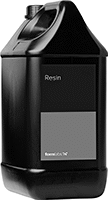

| Impact Strength | Tensile Strength | Color | Flexural Modulus | Hardness | Max. Exposure Temp. | Weight, g | Each | |
Formlabs Resins—Cartridge | ||||||||
|---|---|---|---|---|---|---|---|---|
| 0.75 ft.-lbs./in. (Excellent) | 6,670 psi (Good) | Gray | 270,000 psi (Semi-Rigid) | Durometer 81D (Hard) | 60° C 140° F | 1,000 | 00000000 | 0000000 |
| 1.20 ft.-lbs./in. (Excellent) | 4,780 psi (Poor) | Gray | 200,000 psi (Semi-Rigid) | Durometer 76D (Medium) | 50° C 122° F | 1,000 | 00000000 | 000000 |
Formlabs Resins—Jug | ||||||||
| 0.75 ft.-lbs./in. (Excellent) | 6,670 psi (Good) | Gray | 270,000 psi (Semi-Rigid) | Durometer 81D (Hard) | 60° C 140° F | 5,000 | 00000000 | 000000 |
Resins—Bottle | ||||||||
| 0.74 ft.-lbs./in. (Excellent) | 5,650 psi (Good) | Black | 260,000 psi (Semi-Rigid) | Durometer 65D (Medium) | 60° C 140° F | 1,000 | 0000000 | 000000 |
| 0.88 ft.-lbs./in. (Excellent) | 6,230 psi (Good) | Black | 190,000 psi (Flexible) | Durometer 76D (Medium) | 50° C 122° F | 1,000 | 0000000 | 000000 |
| 0.91 ft.-lbs./in. (Excellent) | 7,100 psi (Good) | Black | 250,000 psi (Semi-Rigid) | Durometer 67D (Medium) | 60° C 140° F | 1,000 | 0000000 | 000000 |
| 1.26 ft.-lbs./in. (Excellent) | 5,360 psi (Good) | Gray | 150,000 psi (Flexible) | Durometer 63D (Medium) | 50° C 122° F | 1,000 | 0000000 | 000000 |
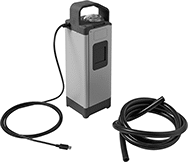
Intake Tube | |||||||
|---|---|---|---|---|---|---|---|
| For Manufacturer | Voltage | Type | OD | Lg., ft. | Discharge Location | Each | |
| Formlabs | 24V DC | Flexible | 1/2" | 5 | Bottom | 00000000 | 0000000 |
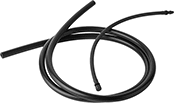
| For Manufacturer | Includes | Each | |
| Formlabs | 5 ft. Rubber Intake Tube, 5 ft. Rubber Transfer Tube | 00000000 | 000000 |
High-Temperature 3D Printer Resins

Parts made from these resins remain strong and rigid in temperatures that would soften most plastic, so they're often used near ovens, engines, and other hot machinery. They're a good lightweight alternative to machined metal parts. Print them on a digital light processing (DLP), stereolithography (SLA), or LCD 3D printer.
Ceramic-filled resins are the stiffest in our 3D printer resin offering once cured. Use them in parts that need to remain stable and not stretch under heavy loads.
Maximum exposure temperature is the point at which a printed part will begin to deform. Above this temperature, your part will start to lose structural integrity.
| Tensile Strength | Color | Flexural Modulus | Impact Strength | Hardness | Max. Exposure Temp. | Weight, g | Each | |
Resins—Bottle | ||||||||
|---|---|---|---|---|---|---|---|---|
| 7,390 psi (Good) | Black | 520,000 psi (Semi-Rigid) | 0.27 ft.-lbs./in. (Poor) | Durometer 94D (Hard) | 275° C 527° F | 1,000 | 0000000 | 0000000 |
Ceramic-Filled Resins—Bottle | ||||||||
| 12,320 psi (Excellent) | White | 1,270,000 psi (Rigid) | 0.45 ft.-lbs./in. (Good) | Durometer 96D (Hard) | 280° C 536° F | 1,650 | 0000000 | 000000 |
High-Strength 3D Printer Resins


Used to print tooling, fixturing, and brackets, these resins create high-performance parts that are strong, stable, and rigid. Print them on a digital light processing (DLP), stereolithography (SLA), or LCD 3D printer.
Formlabs resins come in a cartridge compatible with Formlabs printers—just pop them in. To use them with other printers, they have a removable cap to pour out the contents of the cartridge.
Maximum exposure temperature is the point at which a printed part will begin to deform. Above this temperature, your part will start to lose structural integrity.
| Tensile Strength | Color | Flexural Modulus | Impact Strength | Hardness | Max. Exposure Temp. | Weight, g | Each | |
Formlabs Resins—Cartridge | ||||||||
|---|---|---|---|---|---|---|---|---|
| 9,460 psi (Excellent) | White | 1,360,000 psi (Rigid) | 0.30 ft.-lbs./in. (Poor) | Durometer 89D (Hard) | 160° C 325° F | 1,000 | 00000000 | 0000000 |
| 10,000 psi (Excellent) | White | 493,000 psi (Rigid) | 0.43 ft.-lbs./in. (Good) | Durometer 89D (Hard) | 75° C 170° F | 1,000 | 00000000 | 000000 |
Resins—Bottle | ||||||||
| 10,150 psi (Good) | Black | 400,000 psi (Semi-Rigid) | 0.39 ft.-lbs./in. (Poor) | Durometer 84D (Hard) | 100° C 212° F | 1,000 | 0000000 | 000000 |
| 12,030 psi (Excellent) | Black | 450,000 psi (Semi-Rigid) | 0.24 ft.-lbs./in. (Poor) | Durometer 81D (Hard) | 110° C 230° F | 1,000 | 0000000 | 000000 |
Flexible 3D Printer Resins


Stretchy, soft, and sturdy, these resins make durable parts that resist breaking from repeated use. They’re often used to create long-lasting parts, such as seals, sleeves, and gaskets. These resins are also good for making springs, snap-fit parts, and other components that handle high impact. Print them on a digital light processing (DLP), stereolithography (SLA), or LCD 3D printer.
Formlabs resins come in a cartridge compatible with Formlabs printers—just pop them in. To use them with other printers, they have a removable cap to pour out the contents of the cartridge.
3D Printer Resins
Because these resins balance strength and impact resistance, they're good for printing parts for general purpose applications. They'll work for everything from jigs and fixtures to lightweight housings for aerospace applications. Print them on a digital light processing (DLP), stereolithography (SLA), or LCD 3D printer.
Pop Formlabs resin cartridges right into the cartridge compartment on Formlabs printers, and they'll automatically fill the resin tank. That means you won't lose any resin while transferring them to the tank. To use them with other printers, they have a removable cap to pour out the contents of the cartridge.
When using Formlabs resin jugs with a Formlabs printer, save time and effort by pumping the resin directly into the tank with a resin pump (sold separately).
Resins with a color base and pigments can produce parts in up to 16 solid colors with a matte finish—no dying, painting, or finishing required. Mix the pigments together or add them on their own to the color base cartridge. Each color you create requires the color base, so you’ll have to replace it more than the pigments.
Maximum exposure temperature is the point at which a printed part will begin to deform. Above this temperature, your part will start to lose structural integrity.

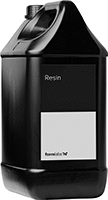

Resins | Replacement Color Bases | ||||||||||
|---|---|---|---|---|---|---|---|---|---|---|---|
| Tensile Strength | Color | Flexural Modulus | Impact Strength | Hardness | Max. Exposure Temp. | Weight, g | Includes | Each | Each | ||
Formlabs Resins—Cartridge | |||||||||||
| 7,190 psi (Good) | Beige | 330,000 psi (Rigid) | 0.59 ft.-lbs./in. (Good) | Durometer 84D (Hard) | 50° C 122° F | 1,000 | __ | 00000000 | 0000000 | 000000 | 00 |
| 7,830 psi (Good) | Gray | 350,000 psi (Rigid) | 0.63 ft.-lbs./in. (Good) | Durometer 86D (Hard) | 60° C 142° F | 1,000 | __ | 00000000 | 00000 | 000000 | 00 |
| 8,260 psi (Excellent) | Black | 350,000 psi (Rigid) | 0.54 ft.-lbs./in. (Good) | Durometer 86D (Hard) | 60° C 142° F | 1,000 | __ | 00000000 | 00000 | 000000 | 00 |
| 8,900 psi (Excellent) | White | 390,000 psi (Rigid) | 0.59 ft.-lbs./in. (Good) | Durometer 86D (Hard) | 70° C 160° F | 1,000 | __ | 00000000 | 00000 | 000000 | 00 |
| 9,380 psi (Excellent) | Black, Cyan, Magenta, White, Yellow | 320,000 psi (Rigid) | 0.46 ft.-lbs./in. (Good) | Durometer 82D (Hard) | 70° C 160° F | 1,000 | Color Base, 5 Syringes, 5 Color Pigments | 00000000 | 000000 | 00000000 | 000000 |
Formlabs Resins—Jug | |||||||||||
| 7,190 psi (Good) | Beige | 330,000 psi (Rigid) | 0.59 ft.-lbs./in. (Good) | Durometer 84D (Hard) | 50° C 122° F | 5,000 | __ | 00000000 | 000000 | 000000 | 00 |
| 7,830 psi (Good) | Gray | 350,000 psi (Rigid) | 0.63 ft.-lbs./in. (Good) | Durometer 86D (Hard) | 60° C 142° F | 5,000 | __ | 00000000 | 000000 | 000000 | 00 |
| 8,260 psi (Excellent) | Black | 350,000 psi (Rigid) | 0.54 ft.-lbs./in. (Good) | Durometer 86D (Hard) | 60° C 142° F | 5,000 | __ | 00000000 | 000000 | 000000 | 00 |
| 8,900 psi (Excellent) | White | 390,000 psi (Rigid) | 0.59 ft.-lbs./in. (Good) | Durometer 86D (Hard) | 70° C 160° F | 5,000 | __ | 00000000 | 000000 | 000000 | 00 |
Resins—Bottle | |||||||||||
| 5,070 psi (Good) | Black | 220,000 psi (Semi-Rigid) | 0.41 ft.-lbs./in. (Poor) | Durometer 77D (Medium) | 50° C 122° F | 1,000 | __ | 0000000 | 000000 | 000000 | 00 |
| 5,360 psi (Good) | White | 180,000 psi (Flexible) | 0.54 ft.-lbs./in. (Good) | Durometer 74D (Medium) | 45° C 113° F | 1,000 | __ | 0000000 | 000000 | 000000 | 00 |
| 5,510 psi (Good) | Gray | 210,000 psi (Semi-Rigid) | 0.48 ft.-lbs./in. (Good) | Durometer 77D (Medium) | 50° C 122° F | 1,000 | __ | 0000000 | 000000 | 000000 | 00 |

Intake Tube | |||||||
|---|---|---|---|---|---|---|---|
| For Manufacturer | Voltage | Type | OD | Lg., ft. | Discharge Location | Each | |
| Formlabs | 24V DC | Flexible | 1/2" | 5 | Bottom | 00000000 | 0000000 |

| For Manufacturer | Includes | Each | |
| Formlabs | 5 ft. Rubber Intake Tube, 5 ft. Rubber Transfer Tube | 00000000 | 000000 |
Flame-Retardant 3D Printer Resins

Create holders, guards, housings, and other parts to protect flammable components. These resins are self-extinguishing and meet UL 94 V-0 for flame resistance. If they do begin to smoke, they won't release toxins into the air because they're halogen free. They also meet ASTM E595, a standard used by NASA, which means they give off almost no volatile emissions that could damage electronics, even in a vacuum.
Print them on a digital light processing (DLP), stereolithography (SLA), or LCD 3D printer. They come in a cartridge compatible with Formlabs printers—just pop them in. To use them with other printers, they have a removable cap to pour out the contents of the cartridge.
Maximum exposure temperature is the point at which a printed part will begin to deform. Above this temperature, your part will start to lose structural integrity.
| Tensile Strength | Color | Flexural Modulus | Impact Strength | Hardness | Max. Exposure Temp. | Weight, g | Each | |
Formlabs | ||||||||
|---|---|---|---|---|---|---|---|---|
| 5,590 psi (Good) | Gray | 390,000 psi (Rigid) | 0.41 ft.-lbs./in. (Poor) | Durometer 80D (Medium) | 90° C 201° F | 1,000 | 0000000 | 0000000 |
Quick-Printing 3D Printer Resins
Speed up your prototyping process with these resins, which print three times faster than other resins. They’re a great choice for rapid prototyping. Print them using a digital light processing (DLP), stereolithography (SLA), or LCD 3D printer.
Pop Formlabs resin cartridges right into the cartridge compartment on Formlabs printers, and they’ll automatically fill the resin tank. That means you won’t lose any resin while transferring them to the tank. To use them with other printers, they have a removable cap to pour out the contents of the cartridge.
When using Formlabs resin jugs with a Formlabs printer, save time and effort by pumping the resin directly into the tank with a resin pump (sold separately).
Maximum exposure temperature is the point at which a printed part will begin to deform. Above this temperature, your part will start to lose structural integrity.

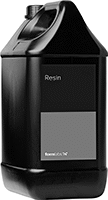

| Tensile Strength | Color | Flexural Modulus | Impact Strength | Hardness | Max. Exposure Temp. | Weight, g | Each | |
Formlabs Resins—Cartridge | ||||||||
|---|---|---|---|---|---|---|---|---|
| 7,980 psi (Good) | Gray | 380,000 psi (Rigid) | 0.56 ft.-lbs./in. (Good) | Durometer 86D (Hard) | 55° C 136° F | 1,000 | 00000000 | 000000 |
Formlabs Resins—Jug | ||||||||
| 7,980 psi (Good) | Gray | 380,000 psi (Rigid) | 0.56 ft.-lbs./in. (Good) | Durometer 86D (Hard) | 55° C 136° F | 5,000 | 00000000 | 000000 |
Resins—Bottle | ||||||||
| 6,810 psi (Good) | Black | 350,000 psi (Semi-Rigid) | 0.37 ft.-lbs./in. (Poor) | Durometer 71D (Medium) | 65° C 149° F | 1,000 | 0000000 | 00000 |

Intake Tube | |||||||
|---|---|---|---|---|---|---|---|
| For Manufacturer | Voltage | Type | OD | Lg., ft. | Discharge Location | Each | |
| Formlabs | 24V DC | Flexible | 1/2" | 5 | Bottom | 00000000 | 0000000 |

| For Manufacturer | Includes | Each | |
| Formlabs | 5 ft. Rubber Intake Tube, 5 ft. Rubber Transfer Tube | 00000000 | 000000 |
Static-Dissipative 3D Printer Resins

Create printed parts that protect electronics from electrostatic discharge (ESD) buildup. These resins are also impact resistant. They’re good for final products, electronics housings, and jigs and fixtures in electronics manufacturing. Print them on a digital light processing (DLP), stereolithography (SLA), or LCD 3D printer. They come in a cartridge compatible with Formlabs printers—just pop them in. To use them with other printers, they have a removable cap to pour out the contents of the cartridge.
Maximum exposure temperature is the point at which a printed part will begin to deform. Above this temperature, your part will start to lose structural integrity.
| Tensile Strength | Color | Flexural Modulus | Impact Strength | Hardness | Max. Exposure Temp. | Surface Resistivity, ohms/sq. | Weight, g | Each | |
Formlabs | |||||||||
|---|---|---|---|---|---|---|---|---|---|
| 6,410 psi (Good) | Black | 260,000 psi (Semi-Rigid) | 0.48 ft.-lbs./in. (Good) | Durometer 90D (Hard) | 60° C 143° F | 105-108 | 1,000 | 0000000 | 0000000 |



























